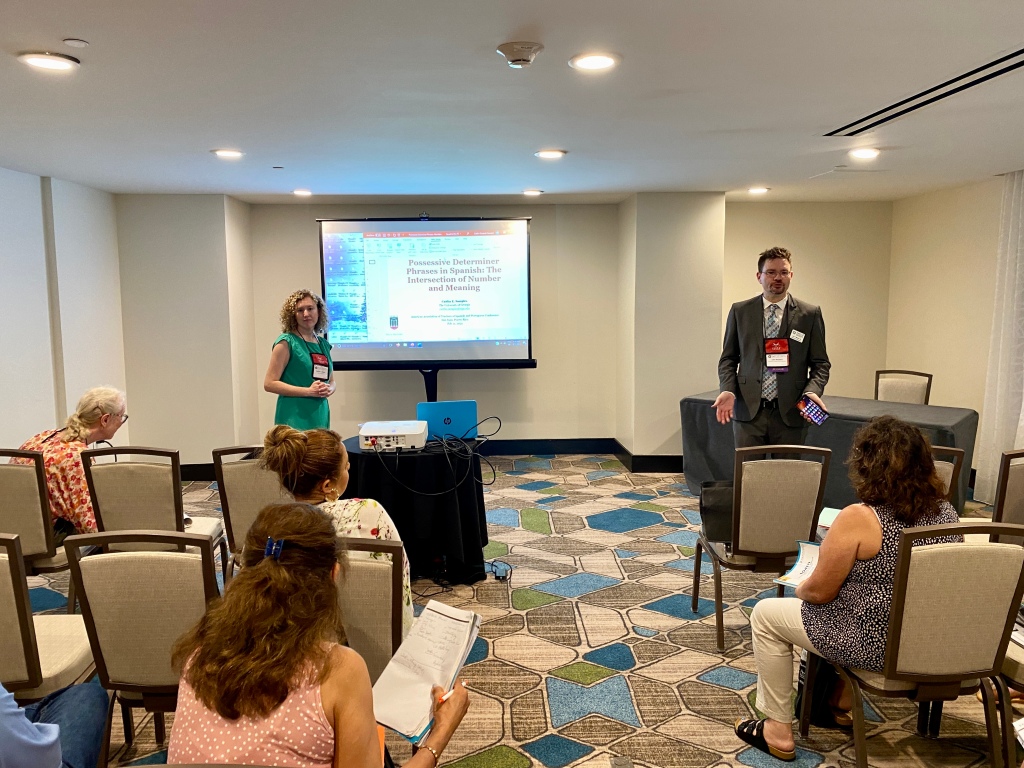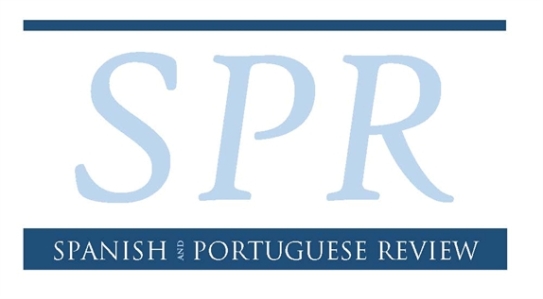Written by Lillian Jones, Managing Editor for SPR
In early July, I had the opportunity to attend the 104th AATSP Annual Conference of the American Association of Teachers of Spanish and Portuguese in San Juan, Puerto Rico. This event runs for three and a half days and is packed with abundant opportunities for graduate students to present their original research, gain insight into the various aspects of academic publishing, network with other graduate students and academic scholars, and learn about current trends in the research and application of Luso-Brazilian and Hispanic languages, literatures, and cultures. This event is especially advantageous for me and my fellow grad students, specifically regarding opportunities for publishing. Below, I share the events and opportunities which myself and my grad student peers took advantage of during our time in Puerto Rico.

From left to right: Ivana Frisa (University of Florida), Sara Sáez (University of Illinois, Urbana-Champaign), Ana Ruiz (University of California, Davis), Diana Torres (Florida Atlantic University), and Lillian Jones (University of California, Davis).
There were several opportunities designed for graduate students to learn about the publishing process, ask questions, connect with editors and peer reviewers, as well as earn a chance to publish in the AATSP’s graduate student journal, Spanish and Portuguese Review.
- On Saturday, July 9th, SPR hosted “SPR Session for Graduate Students: Getting Your Work Noticed”. This session focused on the importance for graduate students to engage with a broader audience, and ways they might expand their network, including reasons for and strategies for leveraging social media to increase the exposure of graduate student work.
The discussion also pointed towards various ways to volunteer at the journal, such as through peer review. Learn more about volunteering with SPR here.
I co-hosted this session with SPR Editor, Stacey M. Johnson, who joined us virtually. Also in attendance was SPR Associate Editor, Ivana Frisa, who was able to offer a unique perspective to volunteering at this academic journal. Find the session PowerPoint here. - Also on Saturday, AATSP’s flagship journal, Hispania hosted a session titled “How to Get Involved and Publish in the Journal”. The hosts, along with questions from the audience, engaged in a lively discussion about the journal and the full publication process, the differences and similarities in submitting research articles and book reviews, and peer review. This session is always helpful to gain a more detailed account of what a prestigious academic journal looks for in submissions, and the rigorous process that both the peer reviewers and authors go through during review, editing, and copyediting, through to the production stage.
- Bright and early on Saturday morning I had the opportunity to present my own work titled “Input, output, & feedback: a triad approach to L2 pronunciation training in a CALL environment”. Presenting research is always such good practice to develop and refine presentation skills, but also the questions that the audience ask can be very eye-opening and reflective. The audience asked many insightful questions, offered unique insight and suggestions for further development of the project. Because of this presentation, I also made a valuable connection with a supportive scholar who offered valuable feedback and will be a good connection when I am on the job market (which will come very soon!). I am very appreciative to all the folks that came to show support and learn at 8:30am on the first day of the conference!
You can view the PowerPoint here. - On Monday, July 11th, a diverse group of graduate students competed in the 2nd Annual Graduate Student Day Competition. This competition is designed for students seeking master’s and/or doctoral degrees to present their original work, refine their presentation skills, practice pitching their research in a short amount of time, and be considered for publication in the Spanish and Portuguese Review. The competition this year saw an array of research topics, including possessive determiner phrases in Spanish, analysis of Brazilian societal narratives, the Chicano movement centered in Chicago, Afro-Mexican culture, Judeo-Spanish in the work of Myriam Moscona, understanding the role of emotions through music in the second language (L2) Spanish classroom, and much more!
Sitting through the entire day of the competition gave me the opportunity to get exposure to the variety of topics in which my fellow grad students are researching and producing such thoughtful and inspiring work. The competitors presented in both English and Spanish, and represented many different universities. I am so proud of this upcoming generation of AATSP grad students!
Congratulations to this year’s winner, Diana Torres! Diana presented “La herida física de Mackandal como fragmentación en El Reino de Este Mundo de Alejo Carpentier”. Two participants received an honorable mention for their work: Fernando Lesniak, “Preferred Gender-Inclusive Language Used by Spanish Speakers in the United States”, and Cecilia Palacio-Ribon, “Ni Negra Ni Blanca: La Poesía de Aleida Violeta en la Lucha Contra la invisibilidad de la Cultura Afromexicana”. Find their full abstracts here. - Throughout the conference there were also many opportunities to learn and network! For example, I attended a variety of sessions which mostly centered around technology in the classroom, but also branched out into learning about the benefits and dangers of using L2 slang, and was introduced to a more underrepresented topic in Spanish for Specific Purposes, teaching Spanish to members of our military.
I also attended the Higher Ed Happy Hour, where I was able to connect with and chat with both other graduate students and faculty, and I enjoyed the the keynote address, where the speaker shared important information about aligning instruction to the state of Spanish in the U.S.. Of course, the celebration dinner and closing ceremonies were joyful and fun! I got to sit at the Graduate Student Day Competition table, where both participants and judges interacted in a more relaxed and casual environment, while recapping the events of the day, and of course, typical to passionate scholars, talking about our research interests and asking for and offering advice to one another.
Attending these events also allowed me to snap selfies with prominent scholars and AATSP members who I admire! And, we all know the power of a good selfie. - The conference also offers social events, such as the wellness run and movie night. These events are really fun and a bit more casual, while still keeping the conference attendees engaged with language and culture and with each other.
For a video recap of the conference from a graduate student perspective, including mini interviews of a few grad student attendees, check out this video!
The AATSP Annual Conference is really an exciting and intellectually inspiring professional development event for scholars at all stages, especially graduate students! This year the efforts of the AATSP team and conference attendees created an inclusive, and supportive environment with ample opportunities for grad students to learn more about the publishing process, network, and meet members on various editorial boards and of course, fellow graduate student authors (many of which have published previously with SPR!).
It is con muchas ganas that I look forward to the AATSP Conference next year in Salamanca, Spain! I hope to see our readers and authors, editorial and peer review team, grad student peers, and all of the wonderful AATSP community in Spain in 2023!



For questions or comments, please feel free to reach out to me at liljones@ucdavis.edu.
Lillian Jones is a PhD Candidate at the University of California, Davis. Her research interests include Spanish linguistics, second language acquisition, computer-assisted language learning, specifically mobile-assisted language learning and text messaging for second language learning.

[…] to SPR have written about the professional development opportunities at the 2021, 2022, and 2023 AATSP […]
LikeLike